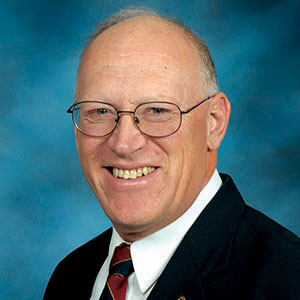Kansas Profile – Now That’s Rural: Bryce Dolan, KSDS Assistance Dogs
Aug. 30, 2023
By Ron Wilson, director of the Huck Boyd National Institute for Rural Development at Kansas State University
![]()
On a transatlantic flight to Europe, Éclair is arriving in Ireland. But this isn’t just another jet-lagged tourist: This is a four-legged traveler.
Éclair is a black lab puppy. She went to Europe as part of an exchange to help enhance the service dogs that assist people across the nation, and she was sent by an assistance dog service in rural Kansas.
Bryce Dolan is director of marketing and fundraising for KSDS Assistance Dogs Inc., which sent the puppy Éclair to Ireland as part of an international exchange.
At right: Corwin, an assistance dog, with Angela | Download this photo
KSDS had its beginnings through 4-H. In 1987, 4-H dog project members from Cloud, Riley and Washington counties began serving as puppy raisers for assistance dog organizations in Ohio and California.
When they realized that very few of these assistance dogs were being placed in the Midwest, they wanted an assistance dog training facility for people in the central U.S.
In 1990, the Kansas Specialty Dog Service (now known as KSDS) opened its doors in Washington, Kansas. KSDS is a non-profit organization that provides professionally trained guide and service dogs for people in need of a canine partner. KSDS is led by CEO Duane Toews and a board of volunteers.
“We began in one old converted steakhouse and now we have a ten-building campus,” Dolan said. That includes canine housing units, agility and training centers, and duplex apartments for human clients who come to get their assistance dogs.
KSDS works with a network of puppy raisers across the nation who care for puppies from age eight weeks to 18 months. Then the puppies come to KSDS for training and vetting before being paired with their human partner.
Clients come to Washington for one or two weeks to train with their assistance dog. “Our clients are so grateful, they come to tears when they are united with their canine partner,” Dolan said.
These dogs change lives. Guide dogs provide independence by helping people who are visually impaired. Service dogs assist those with mobility issues by doing such things as retrieving dropped items, opening handicap accessible doors, or pulling manual wheelchairs.
Remarkably, KSDS assistance dogs are given to clients free of charge. “This is only possible thanks to the generosity of our private donors across the country,” Dolan said. “We don’t accept tax dollars or government funding.”
Hill’s Pet Food is the official dog food sponsor of KSDS. “Hill’s has been huge,” Dolan said. For every client, Hill’s ships free pet food monthly for the life of the dog, and provides free dog food to puppy raisers.
KSDS has many other partnerships providing free or discounted benefits, including the Veterinary Health Center at Kansas State University.
KSDS has a long-standing partnership with the Topeka Correctional Facility for a program called Pooches and Pals, where prison inmates are responsible for the dog’s care.
KSDS is accredited through Assistance Dogs International. ADI is affiliated with the International Breeding Cooperative, which helps produce assistance dogs.
In 2021, KSDS was selected as one of only seven North American assistance dog facilities to send a puppy to Europe. In exchange, KSDS received a puppy credit that will be used to diversify KSDS canine bloodlines and improve the genetic disposition of future assistance dog placements.
Through this program, KSDS has shared breeding stock or specimens with four countries on three continents.
In the U.S., KSDS has placed 630 service dogs in 36 states. It’s a remarkable record for an organization in the rural community of Washington, population 1,071 people. Now, that’s rural.
“We’re going back to our roots,” Dolan said. “We want to engage more 4-Hers and FFA members to be puppy raisers in order to help meet the growing demand for assistance dogs.”
For more information or to donate, go to www.ksds.org.
Éclair made her transatlantic flight – not as a tourist, but as a puppy that was part of an international exchange to benefit future assistance dogs. We commend Duane Toews, Bryce Dolan, KSDS Board members, and all those involved for making a difference and transforming lives through canine assistance.
As with Éclair, they provide puppies with a purpose.
Audio and text files of Kansas Profiles are available at http://www.kansasprofile.com. For more information about the Huck Boyd Institute, interested persons can visit http://www.huckboydinstitute.org.
***
The mission of the Huck Boyd National Institute for Rural Development is to enhance rural development by helping rural people help themselves. The Kansas Profile radio series and columns are produced with assistance from the K-State Research and Extension Department of Communications News Media Services unit. A photo of Ron Wilson is available at http://www.ksre.ksu.edu/news/sty/RonWilson.htm. Audio and text files of Kansas Profiles are available at http://www.kansasprofile.com. For more information about the Huck Boyd Institute, interested persons can visit http://www.huckboydinstitute.org.


